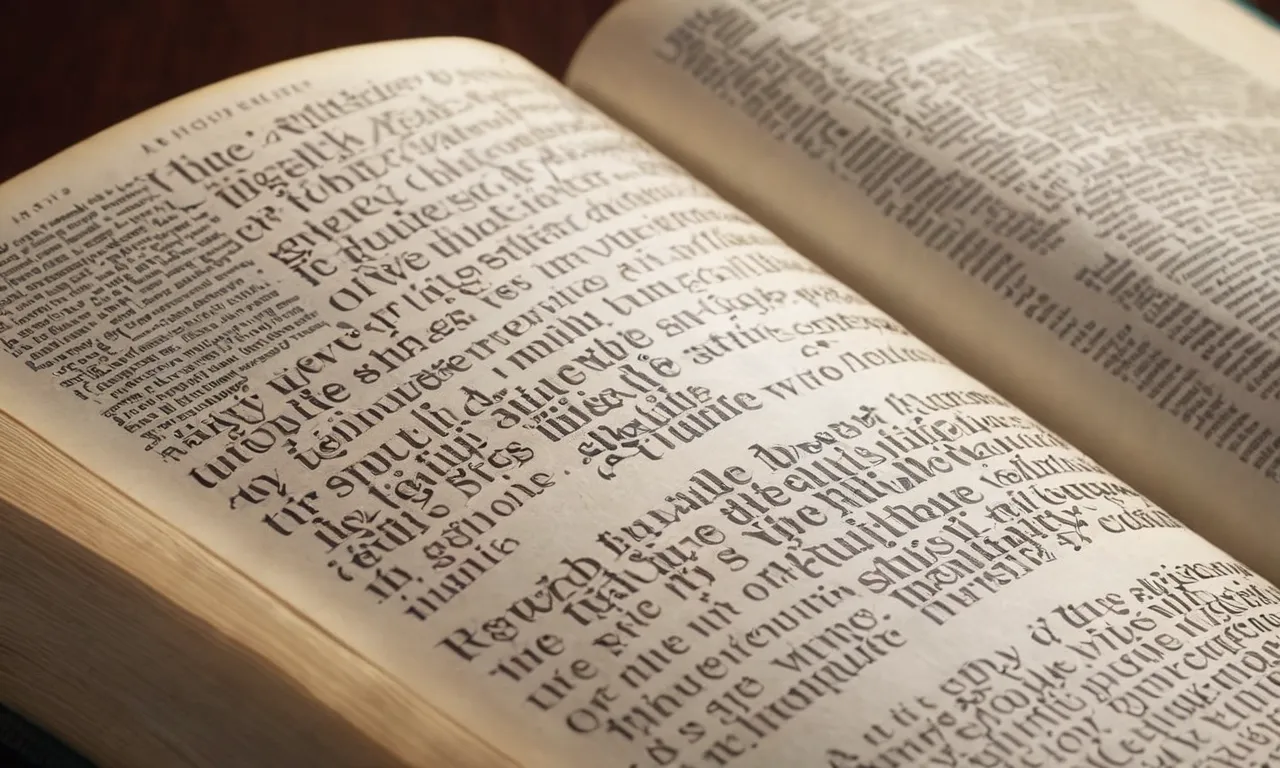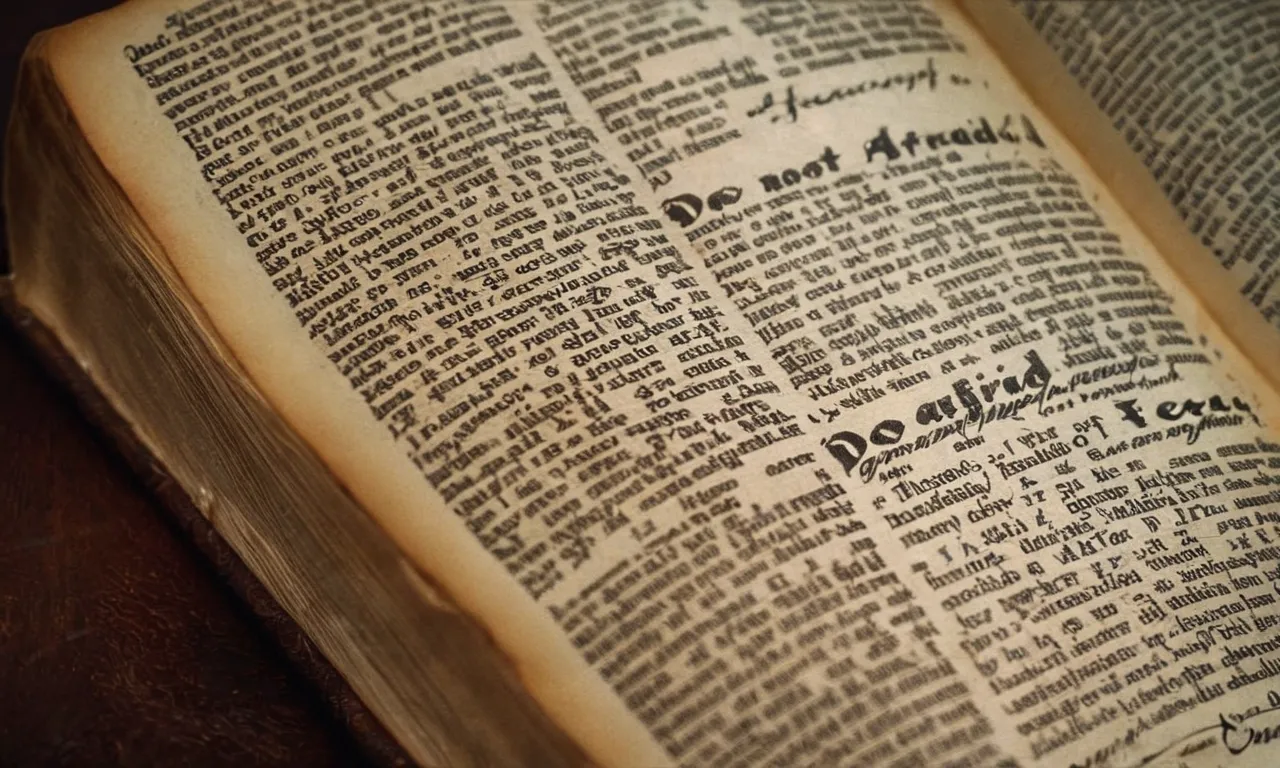How Many Times Does The Bible Say ‘Do Not Be Afraid’?
Fear is a normal human emotion, but God often encourages us in the Bible not to give in to fear. If you’ve ever wondered exactly how many times the Bible tells us ‘Do not be afraid,’ you’ve come to the right place.
If you’re short on time, here’s a quick answer to your question: The phrase ‘Do not be afraid’ and its variations appear over 70 times throughout both the Old and New Testaments.
In this comprehensive article, we will examine the many instances where God commands his people to reject fear and claim his perfect love and peace.
We will categorize and summarize the contexts surrounding each mention of ‘Do not be afraid,’ organize them for easy reference, and reflect on the significance of this frequent biblical theme.
Old Testament Verses Saying ‘Do Not Be Afraid’
‘Do Not Be Afraid’ in the Torah/Law
The injunction “do not be afraid” appears several times in the Torah, the first five books of the Old Testament. When God calls Moses to lead the Israelites out of Egypt, He reassures Moses saying, “Do not be afraid” (Exodus 3:6).
God similarly tells Joshua, “Do not be afraid” as he prepares to lead the Israelites into the Promised Land (Joshua 1:9).
There are also instances where God tells the Israelites as a whole not to fear their enemies (Deuteronomy 1:21, 3:22).
So the foundation of “do not fear” is established in the Torah as God exhorts His people to press forward in faith.
‘Do Not Be Afraid’ in the Historical Books
In the historical books, we continue to see God commanding His people to “fear not.” When Israel faces threats from enemy nations, prophets like Elisha declare “Do not be afraid” and prophesy victory (2 Kings 6:16).
Great leaders like David also urge the people not to fear, reassuring them of God’s deliverance (1 Chronicles 28:20).
As Israel’s kings rely on the Lord rather than military might, He continues to fight for them saying “Do not be afraid.”
‘Do Not Be Afraid’ in the Wisdom Literature
The wisdom literature provides thoughtful reflections on fear and courage. In Proverbs, Solomon observes that the wicked flee even when no one pursues, but the righteous are as bold as a lion (Proverbs 28:1).
The book of Ecclesiastes also muses that no one knows what disasters the future may bring, so we should enjoy life in the present (Ecclesiastes 8:12-13).
While not direct commands, these wisdom sayings encourage people to reject fear and embrace God’s blessings.
‘Do Not Be Afraid’ in the Major Prophets
The major prophets like Isaiah, Jeremiah and Ezekiel echo God’s reassuring words “do not fear.” Isaiah proclaims that Israel need not dread the Assyrians, for God will defend them (Isaiah 7:4).
Jeremiah calls the Israelites not to fear Babylon’s invasion, promising that God will restore them (Jeremiah 42:11).
Ezekiel prophesies that Israel will one day dwell secure and confident, no longer afraid (Ezekiel 34:28). Though judgement comes, the prophets consistently offer hope in God’s sovereignty.
‘Do Not Be Afraid’ in the Minor Prophets
The minor prophets also proclaim “do not fear” in the midst of national crises. Haggai challenges Zerubbabel to take courage as he rebuilds the temple (Haggai 2:5).
Zechariah promises that though Jerusalem is small and weak, God will defend it so its people need not fear (Zechariah 8:13).
Malachi provides assurance that God will spare those who fear Him from judgement (Malachi 3:16-17). Across the board, the minor prophets urge reliance on God over fear of circumstances.

New Testament Verses Saying ‘Do Not Be Afraid’
The Bible contains many reassuring verses where God encourages His people to “not be afraid.” This oft-repeated phrase appears frequently throughout both the Old and New Testaments.
According to Bible Gateway, the exact phrase “do not be afraid” is used 70 times across various Bible translations.
‘Do Not Be Afraid’ in the Gospels
In the four Gospels, Jesus frequently tells his disciples and followers “do not be afraid” as he performs miracles, prepares them for future persecution, and reassures them of God’s love and care. Some key examples include:
- When Jesus walks on water, he tells the disciples “It is I; do not be afraid” (John 6:20)
- After his resurrection, Jesus tells the women at the tomb “Do not be afraid” (Matthew 28:10)
- According to the Collegeville Bible Commentary, “Do not be afraid” is the most frequent command of Jesus in the Gospels.
‘Do Not Be Afraid’ in Acts and the Epistles
The early church leaders and apostles continued Jesus’ message of courage and reassurance in the face of adversity. For example:
- Peter tells Cornelius “Do not be afraid” when he enters his house (Acts 10:4)
- Paul tells the Corinthians “do not be afraid” when encouraging them to walk by faith (1 Corinthians 16:13)
- John sees Jesus in a vision telling him “Do not be afraid” (Revelation 1:17)
The Significance of ‘Do Not Be Afraid’ in Scripture
God Comforts His People
The phrase “do not be afraid” appears over 80 times in the Bible from Genesis to Revelation. God often uses these words to comfort His people in times of fear and distress.
When Moses felt inadequate to lead the Israelites out of slavery, God said, “Do not be afraid, I will help you” (Exodus 3:6-9).
When Joshua was to lead the Israelites into the Promised Land, God encouraged him saying, “Be strong and courageous. Do not be afraid“; for the Lord your God goes with you (Joshua 1:9).
In the New Testament, an angel appeared to Mary and said, “Do not be afraid, you have found favor with God” when she was chosen to bear Jesus (Luke 1:30). When the disciples saw Jesus walking on water, He comforted them saying, “It is I; do not be afraid.” (Matthew 14:27).
These verses demonstrate God’s powerful presence and comfort for His people in the midst of fear and doubt.
Courage to Obey God
The command “do not be afraid” often follows God calling someone to obey Him. When God called Moses through the burning bush and asked him to confront Pharaoh, Moses was afraid. But God assured him, “Do not be afraid, I will help you” (Exodus 3:6,7).
When God called Gideon to rescue Israel from their enemies, He first reassured Gideon with the words “The LORD is with you, mighty warrior. Do not be afraid” (Judges 6:12,13).
Likewise in Jeremiah 1, God appointed the timid prophet Jeremiah to speak difficult truth to Israel, but first He strengthened him saying, “Do not be afraid…I am with you and will rescue you” (Jeremiah 1:8).
Trust in God’s Sovereignty and Care
The command “do not fear” asserts God’s sovereign control and care over people and nations. When foreign armies surrounded Israel, God said through Isaiah, “Do not be afraid, for the battle is not yours, but God’s” (2 Chronicles 20:15). God is able to deliver according to His perfect will and timing.
Therefore, we need not give way to anxiety and fear.
Jesus also assured His disciples, “Are not two sparrows sold for a penny? Yet not one of them will fall to the ground outside your Father’s care…So do not be afraid; you are worth more than many sparrows” (Matthew 10:29-31).
Our Heavenly Father cares for all His creation, so we can trust Him in the uncertainties of life. According to the CDC’s Mental Health 2021 report, over 42% people in America struggle with anxiety issues. Learning to trust God’s sovereignty through Christ can lead to freedom from much distress.
Conclusion
As we have seen, the command ‘Do not be afraid’ and its variations appear extensively across both Old and New Testaments, undergirding pivotal moments in biblical history.
While the context varies, the reason for setting aside fear remains constant: Our mighty God is always present, always good, and always victorious.
May this overview inspire you to read these ‘Do not fear’ passages in their biblical context. May it strengthen your trust in the One who calms every storm, heals every hurt, and works every circumstance for the good of those who love Him. He is for you – so do not be afraid!








